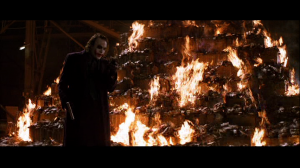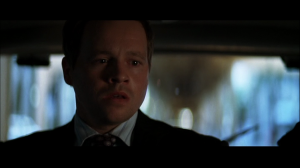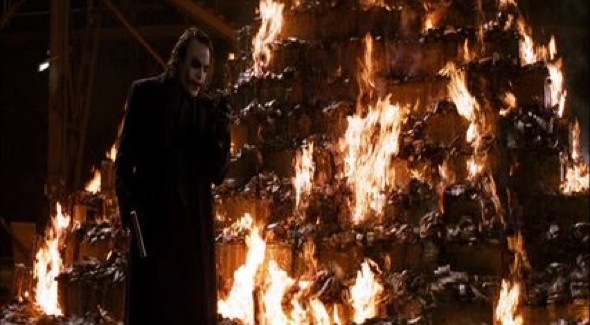“I’m an agent of Chaos. And you know the thing about Chaos? It’s fair.”
The cold, cosmic, fairness of reality that the Joker embodies correlates with the forces that the Inquisitor seeks to inhibit. But not only does the Joker embody chaos, he brings it out in his victims.
“But dost Thou know that for the sake of that earthly bread the spirit of the earth will rise up against Thee and will strive with Thee and overcome Thee, and all will follow him, crying, “Who can compare with this beast? He has given us fire from heaven!” Dost Thou know that the ages will pass, and humanity will proclaim by the lips of their sages that there is no crime, and therefore no sin; there is only hunger? “Feed men, and then ask of them virtue!” (Dostoevsky 252-253).
Morality only exists when mankind has their fill of what Ivan calls ‘earthly bread’ (material possessions, physical desires, comforts, dolla billz). Mankind is entirely too fallible to live exclusively through Christ (what Ivan calls ‘The Bread of Heaven’ or ‘Heavenly Bread’). Christ “didst promise them the bread of Heaven, but, I repeat again, can it compare with earthly bread in the eyes of the weak, ever sinful and ignoble race of man?”( Dostoevsky 253).
Starting to sound familiar? The Joker embodies this dismal truth and exploits the innate, base lawlessness in all humanity. Take, for example, the scene when the Joker burns the pyramid of money and Chechen’s authority with it.
Joker: “Tell your men they work for me now”
Chechen: “They won’t work for a freak like you”
Chechen asserts a moral standard that he and his gang follow. However deplorable it may be, their crime syndicate believes in something. They kill, rape, steal, etc. for money. Lofty, perhaps; but it is their Ideal.
Joker: “How about we cut you up and feed you to your pooches? Then we’ll show you how loyal a hungry dog really is!”
But the Joker is not really speaking about the dogs, of course, but of Chechen’s gang. Just as the Inquisitor knows that there can be no adherence to an ideal without earthly, material possessions, the Joker proves to Chechen that his men are no different than his dogs, who will literally swallow their beliefs and loyalties in order to maintain their “earthly bread.”

Everything burns.
Humanity’s ability to uphold the divine doctrine of Good and Evil, of Right and Wrong is servile at best, for their dedication to any moral structure is conditional upon the fulfillment of physical needs. When there is no material, there is no morality.
“They’re only as good as the world lets them be.”
So how does the Inquisitor attempt to remedy this problem? He provides them with “All that man seeks on earth, that is: someone to bow down to, someone to take over his conscience and a means for uniting everyone at last into a common, concordant, and incontestable anthill” (Dostoevsky 257).
Humans, in their infinite imperfection, require a patriarch to lift the burden of choice from their aching shoulders. In Ivan Karamazov’s poem, the Inquisitor fills this role- removing the choice of what to believe in, and indoctrinating them with a sense of objective morality. In the Dark Knight, the Joker strips them of any such reassuring authority. He leaves a deep footprint on this incontestable anthill and spreads panic and disorder among the ‘ants’ that inhabit Gotham City. The Joker reduces humans to their, bare, primal, and lawless state of existential freedom.
“Freedom, free reason, and science will lead [the masses] into such a maze, and confront them with such miracles and insoluble mysteries, that some of them, unruly and ferocious, will exterminate themselves; others, unruly but feeble, will destroy each other.” (Dostoevsky 258)
What does this sound like?
Joker: “Their morals, their code… it’s a bad joke. Dropped at the first sign of trouble. They’re only as good as the world allows them to be. You’ll see- I’ll show you…when the chips are down, these civilized people… they’ll eat each other.”

Bad news for Coleman Reese.
And thus, the Joker exploits the falseness of any moral structure through his terrorist acts. When the Joker threatens to blow up a hospital, men who could once be labeled as ‘decent’ drop all moral standards and fall in to a state of anthropophagy (that is, until the ferry incident at the end, which I will address later).

small typo , Ayn Rand should be a she not a he in your Grand Inquisitor paragraph
The antecedent of “he” Karamazov.
But good eye; I think you’d enjoy our short-lived (but perhaps someday to be revived) Thursday Grammar Series.
I am genuinely impressed, good work.
Top notch.
Very impressive.
There’s been plenty of discussion on the ferry game, but I don’t think that the outcome redeems the people of Gotham. When the “citizen” tries to push the button and fails, it’s out of weakness, not faith. He, and the women and children in the next shot, are scared and disappointed when he can’t push the button. The “citizens” show the degree to which they need Batman. They are paralyzed by their fear of consequences, so they cannot do what they desire, even if their inaction puts them in peril. If Bruce Wayne were on the boat, instead of hunting the Joker, wouldn’t he have detonated the prisoners’ boat? Maybe, maybe not, but that’s what the “citizens” wanted. They wanted someone else to make the decision, someone with the willpower to judge human life.
Weakness, cowardice, ruthlessness: these are the components of the good citizens of Gotham.
Thanks for the comments.
I agree, it’s not out of faith that Batman will save them or belief in an ideal that stops the citizen from pressing the button, but the fact that neither boat pressed the button redeems them to a degree. Perhaps they didn’t do it out of fear of the consequences, but I think that Nolan was trying to display a man who was afraid to take the lives of other human beings.
Of course all the people on the boat are going to say they want to press the button, who wouldn’t? The Joker had made good on all of his promises up until that point, so why should they think they would have a chance of survival without pressing the button? But there is a vast difference in saying it and doing it. Of course they all want to blow up the boat and save themselves. They’re only human. But the fact that both boats were able to silence their innate cannibalistic instincts and decide not to press the button certainly suggests a hopeful and elevated sense of morality.
As for if Bruce Wayne was on the boat, that’s a tough call. As we saw in the movie, Batman’s one rule is that he will never take a life. Even during the standoff in the street between him and the Joker, Batman chose not to kill the Joker even though he would be saving many lives by doing so.
Question: could the group setting of the ferry test have had an influence on how the people on both boats acted/didn’t act?
Spectacular piece, by the way.
Going back to the boats… We talk about the man who picks up the detonater and then cannot do it because he would be taking life… What about the prisoners?
The prisoners do not have a debate about this, they all look interested but no one subsquently decides to take charge (in a way that the other boat had a vote) then one prisoner takes the detonater and without really over thinking it (sorry lol), throws it out the window..
No one tried to stop him or asked him why, or even gave him a dirty look… they all accepted it…
What do we make of these guys? In comparison to the joker and indeed the other boat?
@Laurence: call me a cynic, but I think it says worse of the civilians than it does of the prisoners. I believe the “We should put it to a vote!” comment is an illustration of the conceit among Western democracies that anything voted on or elected acquires a patina of legitimacy. As if murdering a ferry full of car thieves, non-violent drug users and cigarette smugglers becomes okay because we counted ballots.
It’s the big prisoner*, on the other hand, who stands up and does the right thing without waiting to be asked. In this, he is the person on the boats most like Batman – operating outside social norms, not seeking approval or even permission, being the thankless conscience of a corrupt world.
* I’m paraphrasing Christopher Bird here, but isn’t it amazing that in a film starring Christian Bale, Gary Oldman, Morgan Freeman, Heath Ledger and Aaron Eckhart, the most critical moral pivot in the entire movie is given to Tiny Lister? And he pulls it off?
Lister was also the President in “The Fifth Element.” Just throwing that one out there… ;)
I’m sure everything you’re getting at was purely intentional, Perich. The question of blind faith in democracy comes up all the time in subtle ways, but it’s pretty explicit during the scene in the restaurant where the ballerina says flat out, “But this is a democracy.”
@Perich: Yes I would agree that it does make the civilians on the boat look much worse, all of this is fine. What I don’t understand is why the Joker could not forsee the eventual outcome of the 2 ferries…
The Joker was pretty much a step ahead the whole film, even when we thought he was caught, he planned it, he even counted on Batman stopping him and still had the 2-face card left to play.
Given all of this when it’s past 12 and neither boat has blown the other one up, surely this must shake the joker’s foundations? Does anyone think the Joker would have planned for this (other than blowing the two boats up himself)
I thought his telling Batman about Harvey as he was hanging upside-down *was* the Joker’s contingency plan for not being able to blow up the ferries. Not immediately or independently, but something he knew he could fall back on.
No I think he was going to do that regardless of the outcome of the ferries. The ferries work in a way as a diversion for Batman, he’s more occupied by the joker rather than looking for Dent.
Also if you check the jokers face when it’s past 12 and neither of them have blown up, he is slightly taken aback by it.
@Lawrence: We’re in 100% agreement, so why the “No”? Perhaps I didn’t word it right, so allow me to attempt again. I felt the Joker would have told Batman about Dent no matter what, but his wording, how he pitched it, would depend on what happened with the ferries. So it was something he knew he could fall back on *if necessary* as a shining example of proof of the depravity of humanity; otherwise, it would be a reinforcement of the explosion on the river. Yeah, he probably did expect the boats to blow, but he still knew he had Dent’s fall up his sleeve, jic.
I always believed that the most important part of the grand inquisitor poem was the aspect following the Inquisitors speech, where The lord kisses him, and then leaves without uttering a word. This is, to me, what the ferry gambit was about.
See, the inquisitor may have lost his faith, or perhaps never had it to begin with. He spoke his sad truth to Jesus who by his belief should not even exist, of how he overestimated man and our fragile and weak natures, and Jesus, instead of reacting or fighting, acts with love and then leaves once again into the night.
I always believed that the Inquisitor begun to believe after this, but continued his crusade because he believed it his duty. He was the joker, just for an instance in his estimations of human nature, and of the nature of god, and In one instant of love his beliefs were countered by a single act. In short, despite the years of thought he had given he had forgotten the meaning of faith, which he ony gained afer that night.
My slightly more positive spin on the verse, which I see mirrored in the way that the jokers so far upheld as true beliefs come crashing down when the humans, the simple humans on the barges all live. I do not believe this detracts from the significance of the religious argument, but it could be overlooked as a very important aspect of the Poem.